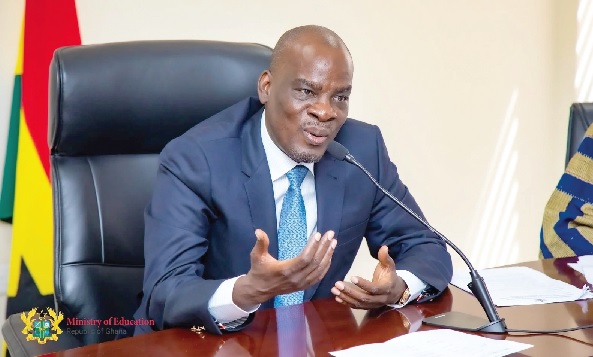The announcement by the Minister of Education that the teacher licensure examination should end in August has attracted the concern of stakeholders who value quality in education.
Considered a quality assurance measure, its cancellation raises apprehension. The examination has consistently revealed that a cross-section of teachers possesses woefully inadequate professional knowledge.
After the first examination and the associated high failure rate, I was on a radio panel that discussed the outcomes.
My co-panellists were educators and union executives – one from the Ghana National Association of Teachers and the other from the National Association of Graduate Teachers. Both executives categorically lauded the licensure examination as a quality assurance move, the failure rate notwithstanding.
However, they were apprehensive about the difficult nature of the questions. When I argued that the questions should rather be tougher, they got alarmed. We reached a consensus that the problem rested with indolent teachers, because such baulk at learning.
Their proposed intervention was that teachers would be served with past questions to help them prepare better for future licensure examinations. I considered that move as spoon-feeding teachers. They did not disagree.
The move for cancellation is a typical Ghanaian move to hide a weakness instead of working to overcome a challenge. In standard education, examination failure could represent knowledge gaps in candidates.
An educational system that prioritises excellence establishes avenues for remedial, so that candidates who lag in knowledge can study and bridge the gap. Such measures ensure that learners and professionals acquire the requisite knowledge for the academic and professional levels they claim or occupy. Such a system operates on merit. Ghana is galloping furiously away from merit and excellence in education and the workforce.
The leakage eyesore that characterises the BECE and WASSCE examinations is a sad proof of mediocrity. The society has become desensitised to dubiousness and praises learners who pass through the apparent dubiousness.
The canker has spiralled to tertiary institutions. About 13 years ago, two instructors in mathematics – one from a public university, the other from a private university – complained about an emerging work pressure. The respective academic boards subtly indicated that they should not fail students.
Such subtlety has since given way to blatant persecution of instructors for students’ high failure rate in examinations.
The hypocrisy in that stance stems from the fact that the students in question may not even have qualified for the university classroom.
Fee-paying students can get into any programme with whatever porous grades amidst other compromised steps. Conversely, one consistently wonders about teaching and learning at the basic and secondary levels.
How is it possible that many learners spend between 12 and 14 years learning English, yet cannot construct a single correct sentence in English, the medium of instruction and expression, by the time they reach the tertiary classroom?
Such learners find reading a chore because they cannot read, let alone comprehend the material read.
Their comprehension skills remain abysmally low, so information processing is an unattained learning goal. Composing essays is an impossibility for such students.
Logically, such students struggle academically and achieve mediocrity at best, especially in an environment where learning resources are scarce. Alarmingly, academically-challenged students are on the increase, for complicated reasons.
Yet, learning institutions across learning levels are focused on commercialising information instead of ensuring learning. Learner needs are heartlessly ignored by school administration, so teaching/learning hiccups continuously escalate.
Instead of investigating poor performance to strategise for effective teaching/learning, oversight bodies and learning institutions focus on superficiality: passes.
Despite examination malfeasance and the slapping reality that effective learning is not occurring, that learning resources are deliberately withheld for administrative greed and learner exploitation, strange passes occur, even excellent grades and classes.
Quality – in the minority, though – and ill-prepared graduates are absorbed across all sectors of the workforce. The education sector receives its adequate quota – employees are only interested in receiving government money.
Logically, the same lackadaisical attitude, which culminates in poor performance, almost no service or mediocrity, rears its ugly head across classrooms, sometimes equally split between the learner and the teacher.
If any such cross-section of teaching elements is examined on professional knowledge and preparedness for nurturing human capital, such will fumble.
For the sake of humanity, such human resources should only be aided to improve in knowledge and skill to strengthen the base of the nation's human capital.
But this is a country that runs away from reality and hard work to engage in rhetoric and semantics. “Keeping Appearances”. So here we go, living up to form, closing an effective standard avenue to set up a committee to work out something for quality.
Typically, we may not hear of any replacement again, and another regime may have to re-establish the licensing process at some point in the nation's lifetime.
Jaundiced elements can be ignored for their selfishness and short-sightedness in effective human resource mobilisation.
The same cannot go for the person heading the education sector, known for being savvy in human dealings in the past.
The Minister of Education ought to question himself whether his move will place him in history as a pursuer of quality or advocate for mediocrity/sub-standard education.
For this writer, it is all about what the nation is denying the growing generations, so-called future leaders, and moaning about the deliberate sinking of a human fleet. What a country!
The writer is a Sr. Lecturer, Language and Communication Skills, Takoradi Technical University, Takoradi.
Writer’s E-mail: dinah.amankwah@ttu.edu.gh

